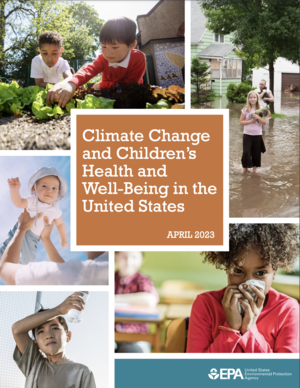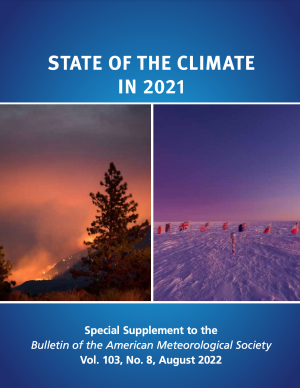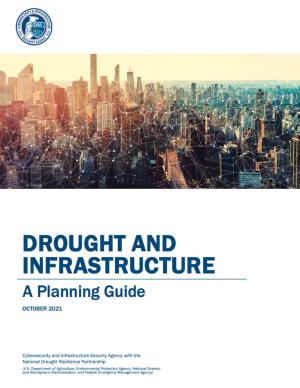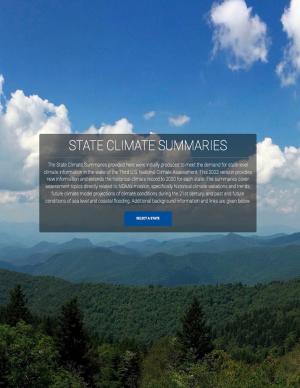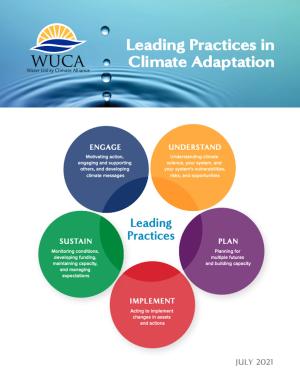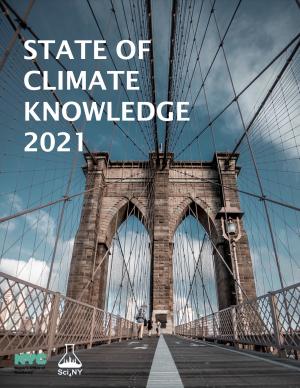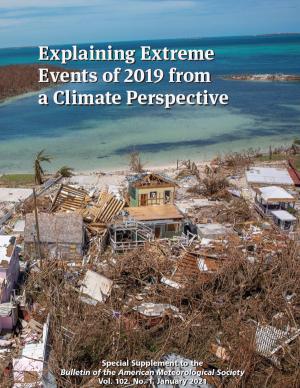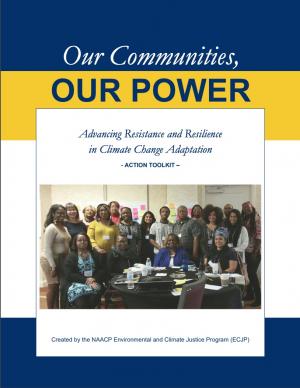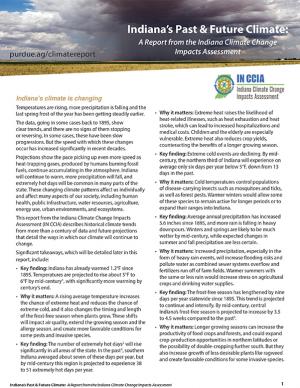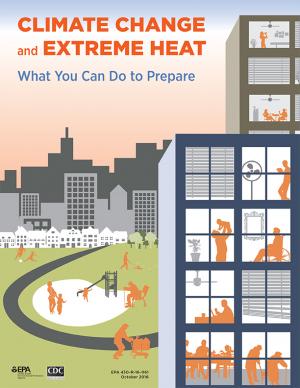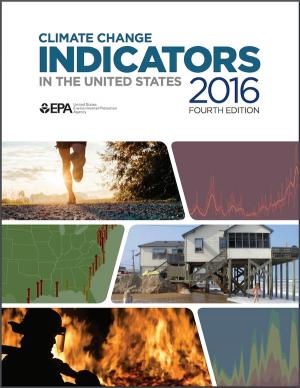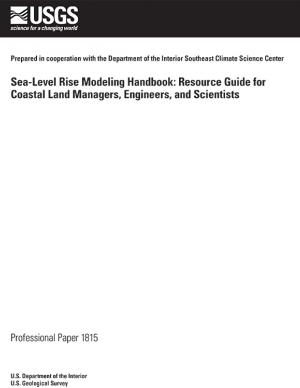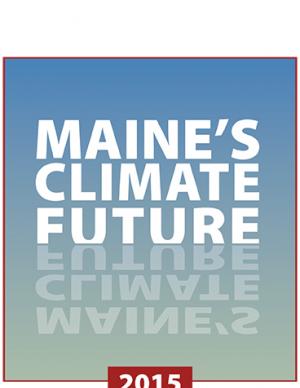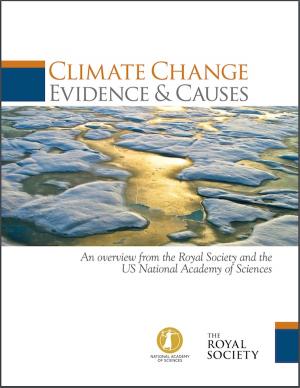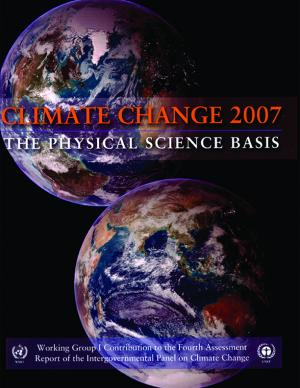Access a range of climate-related reports issued by government agencies and scientific organizations. Browse the reports listed below, or filter by scope, content, or focus in the boxes above. To expand your results, click the Clear Filters link.
Our climate is changing, and the health and well-being of children will continue to be affected in many ways. Children are uniquely vulnerable to climate change due to a variety of physical, cognitive, behavioral, and social factors. Climate change-related impacts in childhood can have lifelong consequences due to effects on learning, physical health, chronic disease, and other complications.
This national-scale, multi-sector report quantifies projected health effects associated with extreme heat, air quality, changing seasons, flooding, and infectious diseases. Where possible, the analyses consider the extent to which these risks disproportionately fall on children from overburdened populations.
An international, peer-reviewed publication released each summer, the State of the Climate is the authoritative annual summary of the global climate published as a supplement to the Bulletin of the American Meteorological Society. The report, compiled by NOAA’s National Centers for Environmental Information, is based on contributions from scientists from around the world. It provides a detailed update on global climate indicators, notable weather events, and other data collected by environmental monitoring stations and instruments located on land, water, ice, and in space.
This Drought Guide, developed through the interagency National Drought Resilience Partnership, can be used to anticipate and prepare for the consequences of drought on infrastructure services. This resource directs users to the National Integrated Drought Information System (drought.gov) and other agencies’ information and decision tools.
This is the FY22 edition of the U.S. Gllobal Change Research Program's annual report to Congress mandated by the the Global Change Research Act. The report provides an overview of the Program’s progress in delivering on its strategic goals as well as a summary of agency expenditures under USGCRP’s budget crosscut.
The State Climate Summaries provided here were initially produced to meet the demand for state-level climate information in the wake of the Third U.S. National Climate Assessment. This 2022 version provides new information and extends the historical climate record to 2020 for each state. The summaries cover assessment topics directly related to NOAA’s mission, specifically historical climate variations and trends, future climate model projections of climate conditions during the 21st century, and past and future conditions of sea level and coastal flooding. Additional background information and links are given below.
This collection of leading practices in climate adaptation covers a suite of climate adaptation actions and is intended to broadly promote collaborative learning. Each practice in the collection is explained and supported by concrete examples. These practices are drawn from WUCA work products and WUCA members' experiences, and, when possible, connected to relevant resources and related efforts. Most of these practices are appropriate for water utilities of any size, as well as other sectors interested in climate adaptation.
The current practices and where they are placed within the five essential climate adaptation action areas:
- Engage
- Understand
- Plan
- Implement
- Sustain
It is important to note that these action areas and leading practices are not prioritized. Instead, the most useful practices depend on the individual organization's needs and priorities.
In 2020, New York City's Mayor’s Office of Resiliency initiated an engagement process, called the Climate Knowledge Exchange, to align research with climate resiliency and adaptation needs. This report is the first in an annual series that will maintain a public agenda for climate research in NYC. The report communicates NYC’s research needs to external partners, including academic scientists, federal researchers, philanthropic foundations, and community organizations. This in turn will catalyze new and creative partnerships to develop credible and actionable research products that address NYC’s most pressing climate challenges. The report includes the engagement methodology and survey text used with various agencies.
This series of BAMS special reports presents assessments of how human-caused climate change may have affected the strength and likelihood of individual extreme events. The series has been published annually since 2011.
The ninth edition of the report, Explaining Extreme Events in 2019 from a Climate Perspective, presents 15 new peer-reviewed analyses of extreme weather across four continents and one sea during 2019. It features the research of 77 scientists from 7 countries looking at both historical observations and model simulations to determine whether and by how much climate change may have influenced particular extreme events.
The world continues to emit greenhouse gases while the planet's climate is changing faster than ever. This report intends to take up the latest and most essential scientific findings published in an extraordinary year—the climate science year in review.
The Beloved Community is a vision for our future where all people share equally in the wealth and bounty of the earth, where we protect its abundance, diversity, and beauty for future generations. In this vision of liberation, racism, exploitation, and domination are replaced by democracy, cooperation, interdependence, and love. To get there, we pursue transformative, systems-change solutions. What do we mean by this? The root causes of the problems our communities face—like climate change, racism, and economic inequality—are all deeply connected. Since the problems are connected, so are the solutions. The purpose of this toolkit is to put us on the path toward achieving this vision. Through the context of building equity and resilience into climate adaptation planning, we introduce strategies to transform our communities and, by extension, society. Our ultimate goal is to create lasting and systemic change. At the same time, we recognize the urgency of the issues our communities face and the need to take action now. That is why we pursue change at every scale—from policy changes to community-based projects—to institute the transformative change we need to uphold our vision of the beloved community.
Indiana’s climate is changing. Temperatures are rising, more precipitation is falling, and the last spring frost of the year has been getting steadily earlier. This report describes historical climate trends from more than a century of data and future projections that detail the ways in which our climate will continue to change.
The Montana Climate Assessment (MCA) synthesizes, evaluates, and shares credible and relevant scientific information about climate change in Montana with the citizens of the state. The motivation for the MCA arose from citizens and organizations in Montana who have expressed interest in receiving timely and pertinent information about climate change, including information about historical variability, past trends, and projections of future impacts as they relate to topics of economic concern. This first assessment reports on climate trends and their consequences for three of Montana’s vital sectors: water, forests, and agriculture.
Climate change affects human health by making extreme heat more common, more severe, and last longer. That is expected to continue into the future. This handbook explains the connection between climate change and extreme heat events, and outlines actions citizens can take to protect their health during extreme heat. This resource builds on the 2006 Excessive Heat Events Guidebook from the Environmental Protection Agency (EPA), and includes up-to-date climate information from recent climate assessment reports, such as the 2014 Third National Climate Assessment, the 2016 Impacts of Climate Change on Human Health in the United States, and EPA’s 2016 Climate Change Indicators in the United States.
This report features observed trend data on 37 climate indicators, including U.S and global temperatures, ocean acidity, sea level, river flooding, droughts, and wildfires. It documents rising temperatures, shifting patterns of snow and rainfall, and increasing numbers of extreme climate events, such as heavy rainstorms and record high temperatures. Many of these observed changes are linked to the rising levels of carbon dioxide and other greenhouse gases in our atmosphere, caused by human activities.
This report synthesizes available science on the observed and projected impacts of climate change in the Great Lakes Basin and documents the climate change assessment methods applied in the region. It was initiated in support of commitments under Annex 9-Climate Change Impacts of the Great Lakes Water Quality Agreement to take into account the climate change impacts on the chemical, physical, and biological integrity of the waters of the Great Lakes and communicate and coordinate binationally regarding ongoing developments of domestic science. The report draws upon the range of research conducted by various levels of government, academia, and other organizations and the growing body of knowledge in areas of ecological research and climate change and provides researchers, managers, and decision makers with a time-stamped, thorough, and methodical examination of that climate change science.
This handbook (USGS Professional Paper 1815) was designed as a guide to the science and simulation models for understanding the dynamics and impacts of sea level rise on coastal ecosystems. Coastal land managers, engineers, and scientists can benefit from this synthesis of tools and models that have been developed for projecting causes and consequences of sea level change on the landscape and seascape.
This report builds on Maine’s earlier report from 2009—it is not intended as a comprehensive revision of all aspects of the original report. This update focuses on highlights of the understanding in 2015 of past, present, and future trends in key indicators of a changing climate specific to Maine, and recent examples of how Maine people are experiencing these changes.
Successfully negotiating climate change challenges will require integrating a sound scientific basis for climate preparedness into local planning, resource management, infrastructure, and public health, as well as introducing new strategies to reduce greenhouse gas emissions or increase carbon sequestration into nearly every sector of California’s economy. This Research Plan presents a strategy for developing the requisite knowledge through a targeted body of policy-relevant, California-specific research over three to five years (from early 2014), and determines California’s most critical climate-related research gaps.
This report is a synthesis of climate science relevant for management and planning for Colorado's water resources. The report focuses on observed climate trends, climate modeling, and projections of temperature, precipitation, snowpack, and streamflow.
This plan—an update to the 2009 California Climate Adaptation Strategy—augments previously identified strategies in light of advances in climate science and risk management options.
A 24-year tradition encompassing the work of 425 authors from 57 countries, 2013's State of the Climate report uses dozens of climate indicators to track patterns, changes, and trends of the global climate system.
This report uses a Question and Answer format to discuss climate change and its causes. The booklet provides an authoritative overview of global climate change for decision makers, policy makers, educators, and other individuals seeking information on climate science.
The Sacramento-San Joaquin River Delta is the grand confluence of California’s waters, the place where the state’s largest rivers merge in a web of channels—and in a maze of controversy. In 2009, seeking an end to decades of conflict over water, the California Legislature established the Delta Stewardship Council with a mandate to resolve long-standing issues. The first step toward that resolution is the Delta Plan—a comprehensive management plan for California’s Sacramento-San Joaquin Delta, developed to guide state and local agencies to help achieve the co-equal goals of providing a more reliable water supply for California and protecting, restoring, and enhancing the delta's ecosystem.
This report, representing the Intergovernmental Panel on Climate Change (IPCC) Working Group I's contribution to the IPCC Fifth Assessment report (AR5), explores the hard science elements of global climate change.
In determining appropriate adaptation strategies, project staff worked with participants to survey a wide range of potential strategy options and develop a process for evaluation and prioritization of targeted strategies.
This publication is intended to assist public health officials, practitioners, and other stakeholders in their efforts first to understand and then to prepare for drought in their communities. It provides information about how drought affects public health, recommends steps to help mitigate the health effects of drought, identifies future needs for research and other drought-related activities, and provides a list of helpful resources and tools.
This report quantifies the outcomes of different stabilization targets for greenhouse gas concentrations using analyses and information drawn from the scientific literature. Although it does not recommend or justify any particular stabilization target, it does provide important scientific insights about the relationships among emissions, greenhouse gas concentrations, temperatures, and impacts. The report emphasizes the importance of 21st century choices regarding long-term climate stabilization, and is a useful resource for scientists, educators, and policy makers, among others.
King County in Washington State has established a comprehensive program to prepare for climate change, and many of the tools and strategies that King County has employed can be applied in other communities. This memorandum from the King County Office of Strategic Planning and Performance Management, published by the American Planning Association, describes strategies developed in King County to direct local government efforts to address climate change.
This comprehensive scientific assessment of past, present, and future global climate change represents the Intergovernmental Panel on Climate Change (IPCC) Working Group I's contribution to the IPCC Fourth Assessment report (AR4). The assessment confirms that the scientific understanding of the climate system and its sensitivity to greenhouse gas emissions is richer and deeper than ever before. The chapters forming the bulk of this report describe scientists' assessment of the then state-of-knowledge in their respective fields.
This Executive Order requires that King County, Washington, municipal departments employ coordinated strategies of land use to mitigate and adapt to global warming.

